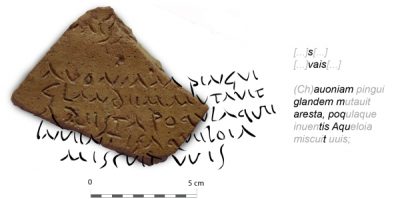
Virgili quote found for the first time in a Roman jar intended for olive oil trade discovered in the municipality of Villalón (Córdoba), dating from the 2nd-3rd centuries AD.
It measures only 6 centimeters wide and 8 long, but the greatness and uniqueness of its discovery have left the international archaeological community perplexed, according to a press release from the University of Córdoba (UCO).
Never before had verses by the author of the Aeneid been documented on an amphora intended for olive oil trade.
It is the fragment of an oil amphora from Roman Baetica, manufactured about 1,800 years ago, with an inscribed text found during surveys carried out in the municipality of Hornachuelos, Cordova, by members of the OLEASTRO project from the Universities of Cordova, Seville, and Montpellier.
Researchers were not initially surprised to receive the pottery fragment, as there are millions of ceramic pieces from Ancient Rome. The Monte Testaccio in Rome alone is an infinite source of information about the Roman olive oil and wine industry.
Piero Berni, an ArPA associate researcher at the ICAC and associated researcher at the University of Montpellier (LabEx Archimede), is one of the authors of the article that publishes this important scientific finding.
It is also not unusual to find words printed on amphorae. In fact, the data printed on the amphorae (producer names, quantities, fiscal control, etc.) have allowed archaeology to reconstruct the history of agricultural trade in ancient Rome.
Thus, finding a piece of an amphora in an area like the Guadalquivir River valley, considered one of the nerve centers of olive oil production and trade in the entire Empire, was not strange. Around Corduba, present-day Córdoba, a significant portion of the olive oil consumed by Rome was produced and packaged, as evidenced, for example, by the remains of amphorae with the seal of Baetica preserved in Monte Testaccio.
However, what initially seemed like just another piece of pottery became notably interesting. Everything changed when the epigraphy was deciphered, revealing the following fragments of words:
S
vais
avoniam
glandemm
arestapoqv
tisaqv
it
And the researchers overlay it to match fragments of the seventh and eighth verses of the first book of the Georgics, a poem by Virgil dedicated to agriculture and rural life written in 29 BC, which say:
Auoniam[pingui]
glandem m[utauit]
aresta, poq[ulaque]
[inuen]tis Aqu[eloia]
[miscu]it [uuis]
C[ambió] la bellota aonia por la espiga [fértil] [y mezcl]ó
el ag[ua] [con la uva descubierta]
This constitutes the first documented case of a Roman amphora and is of exceptional interest to archaeologists, epigraphers, and Latin philologists.
The main thesis of the researchers, now published in the paper in the Journal of Roman Archaeology, is that those verses were written on the lower area of the amphora without the intention of anyone noticing, solely as a demonstration of knowledge and culture by the person who did it, indicating a certain degree of literacy in a rural area like this part of the Guadalquivir valley.
And who was the person who did it? Here, the authors propose several possibilities: that it was done by a specialized worker from the establishment with a certain degree of literacy or by someone from nearby villas associated with an aristocratic family that owned the industry. Additionally, they leave open the possibility that it was done by a child worker, whose existence has been previously documented in these types of establishments.
An international team of archaeologists has dedicated seven years of study to verify the exceptional nature of the piece discovered in the Cordovan countryside. The results have been presented in an article in the prestigious Journal of Roman Archaeology at the University of Cambridge. Piero Berni (ICAC – Univ. Montpellier) is one of the authors.
The verses on the Hornachuelos amphora constitute a unique piece that raises new questions to be answered.
Virgil was the most popular poet of his time and for many centuries after. The Aeneid is taught in schools, and its verses are commonly written as a pedagogical exercise for many generations. That is why it is common to find them in remains of construction ceramics, and many authors have attributed educational functions to these tablets – Roman students used to write Virgil on their slate tablets – as well as funerary functions (Virgil’s verses served as epitaphs on many occasions).
But why on an amphora? And why the Georgics instead of the Aeneid? It is here that researchers realized that this tiny piece of pottery could truly be a uniquely valuable item. Verses by Virgil have never been documented on an amphora intended for olive oil trade.
Reference: González Tobar, I.; Soler i Nicolau, A.; Berni Millet, P. (2023). “Las Geórgicas de Virgilio in figlinis: A propósito de un grafito ante cocturam sobre un ánfora olearia bética”, Journal of Roman Archaeology 1(22). doi:10.1017/S1047759423000156
Media Impact
The exceptional finding and the publication of the results of seven years of study have caused a significant media impact, which can be seen in this collection of news:
- Virgil quote found on fragment of Roman jar unearthed in Spain | Archaeology | The Guardian
- Aparece, por primera vez, un poema de Virgilio en los restos de un ánfora romana de aceite (uco.es)
- Hallado en Córdoba un poema de Virgilio grabado en un ánfora romana | Cultura | EL PAÍS (elpais.com)
- Hallan un poema de Virgilio en un ánfora romana en Córdoba (rtve.es)
- Hallan en Córdoba un poema de Virgilio en un ánfora romana de aceite fabricada hace 1.800 años | Actualidad | Cadena SER
- El poema de Virgilio grabado en un ánfora romana de aceite hallada en Córdoba (lavanguardia.com)
- Aparece un poema de Virgilio en un fragmento de ánfora romana (elindependiente.com)
- Hallazgo excepcional en Córdoba: un poema de Virgilio grabado en un ánfora romana (elespanol.com)
- Encuentran por primera vez un poema de Virgilio en los restos de un ánfora de aceite romana | Cultura (elmundo.es)
- Descifran un poema de Virgilio en un ánfora romana de aceite hallada en Córdoba (abc.es)
Here at the ICAC, we extend our congratulations to the authors of the study and the entire team that has collaborated on it, for the magnificent results obtained and also for the recognition of the work done, which is well-deserved! Congratulations, Piero!






